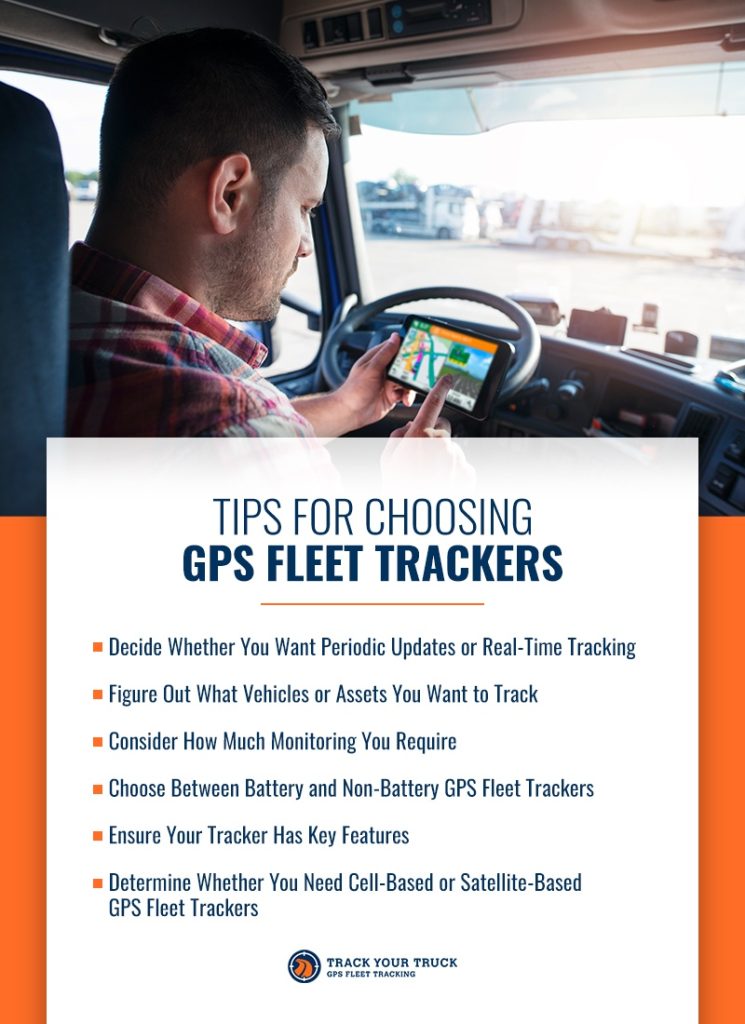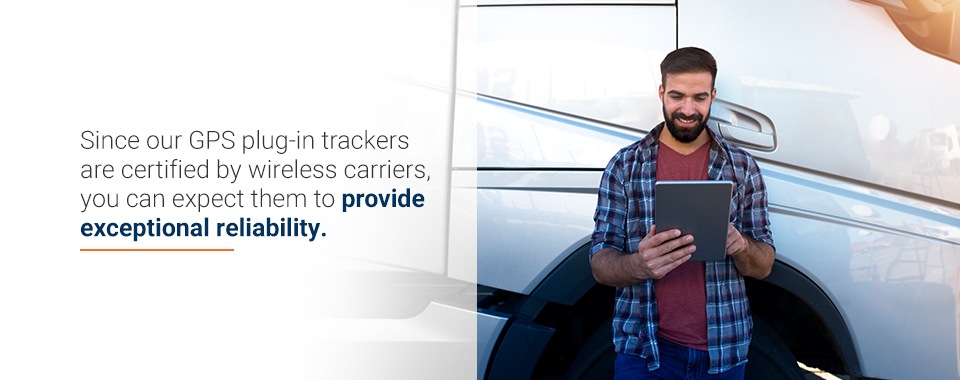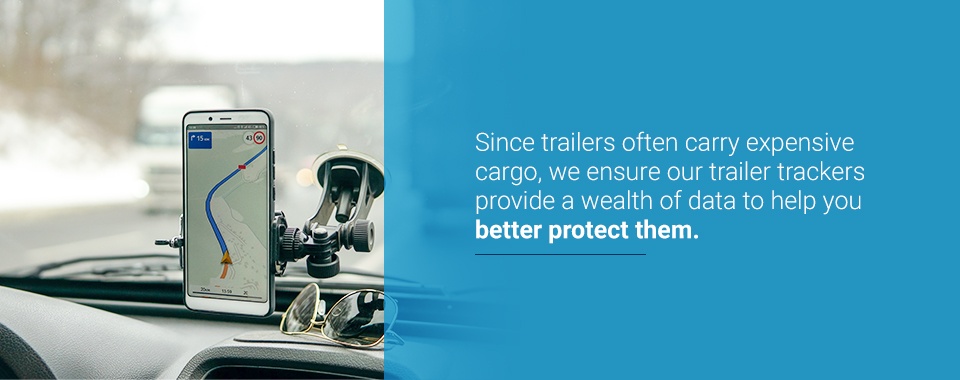

To get the most out of your company’s fleet, you need data about how your drivers and vehicles perform. With the right GPS tracking devices installed in your vehicles and trailers, you can gain key insights about your fleet’s performance and use this information to optimize your operations. When selecting tracking devices, ensure you begin the buying process fully informed about what you need in a fleet tracker.
Learn more about how to choose the right GPS tracking device with some of the top tips for picking devices that fulfill your fleet’s requirements.

Understanding the main differences between trackers and honing in on what you need your tracker to do can help you pick devices that give you the best visibility and data for your company. For example, you may want real-time tracking from your devices, in which case you’d want to avoid trackers that only offer periodic updates. Take a moment to review some of the top tips for choosing GPS fleet trackers below:
One of the first decisions to make when you select GPS fleet trackers is whether you need devices offering real-time tracking or those with periodic updates.
With real-time trackers, your staff can know where all your vehicles are all day, every day of the week. Since these trackers transmit data in real time, the devices will constantly send information about a vehicle’s location and status to your system. Usually, companies that want to keep a close eye on their fleet and receive in-depth analytics about their vehicles prefer real-time trackers.
Unlike real-time trackers, periodic trackers send updates about your fleet’s vehicles at specified intervals. For example, a periodic tracker may send a location update about the vehicle it’s tracking once per day. Generally, companies that want to save on a device’s battery life use these trackers, since periodic trackers don’t need to track and transmit information all day like real-time trackers will.
Before you purchase GPS fleet trackers, it’s important to figure out what you want to track with your device. Some trackers are designed for trailers, and others are made for light-duty and medium-duty trucks and cars. You’ll tailor your device selection to your fleet’s vehicles, such as commercial truck tracking devices.
As you decide between GPS fleet trackers, you’ll need to consider what metrics you want to track. While you can expect GPS trackers to monitor your assets and vehicles’ locations, you may want to receive more information about your fleet. Some trackers can let you know the temperature of a cargo hold, provide information on the vehicle’s performance or send reports about driver safety.
Another distinction you’ll need to make is between battery-powered, hardwired and hybrid GPS fleet trackers. These devices provide different advantages and are appropriate for various applications. Take a moment to review what you can expect from each of these devices:
The right tracker should offer the features you need for successful tracking. This may include communication options, driver safety tracking, easy-to-use interfaces, alert systems and mobile access. It’s also a good idea to have a tracker backed by in-depth customer support from the vendor.
Find out more about the key features you’ll want your tracker to have below:
Another key factor to consider is whether you want satellite-based or cell-based GPS fleet trackers. Cell-based GPS fleet trackers gather data from a vehicle and send the data to the cloud via cell towers. This tracking method is more common than satellite tracking, providing users a more economical solution and transmitting information faster.
Like cell-based GPS trackers, satellite-based GPS trackers use a device to gather information about a vehicle. However, instead of transmitting this data via cellular towers, these devices send information via satellite networks. This option is usually best for companies with vehicles operating in remote locations where cell towers aren’t located. By using satellite networks, these trackers can transmit data from even the most remote locations.
Cell-based tracking devices are usually a good choice for companies with drivers that stay on routes with consistent cell coverage. Since these trackers typically come at a low cost and can quickly transmit information when in areas with cell coverage, they’re a great option for companies that do not frequent remote locations.
Satellite trackers may be the better choice for your business if your employees regularly drive through remote locations where there aren’t cellular towers. With satellite trackers, you’ll receive accurate information about your vehicle’s performance no matter where it’s located. These trackers can also keep your staff safer in remote locations where they might not have cell service, as drivers can use these trackers to call for help.
At Track Your Truck, we know how important it is for companies to have choices when it comes to their GPS fleet tracker. Since each business has different requirements, we offer many different GPS fleet tracking devices to help you find the perfect one for your needs. Learn more about some of our top tracking devices below:

With our premium GPS plug-in vehicle tracker, you receive an advanced tracking device with an easy-to-install construction. Instead of performing complex wiring to get the device to work in your vehicles, all you have to do is plug it into an OBDII port. With the device plugged in, it can track vehicle speed, heading and location 24/7. With all this data, your team can keep tabs on your drivers and ensure they’re performing optimally.
Since our GPS plug-in trackers are certified by wireless carriers, you can expect them to provide exceptional reliability. They also connect with our software, allowing you to keep tabs on multiple vehicles, no matter where your vehicles are or what time it is. We outfit our GPS fleet trackers with battery backups and internal antennas to give you information about the vehicle’s location in the event of theft or driver tampering.
These fleet trackers also provide your team multiple GPS update options to ensure you have greater control. They contain the latest tracking technology, over-the-air firmware and programming updates, and 2,000 buffered messages. Since our plug-in GPS devices are 50-channel, they provide location monitoring within just 2 meters of accuracy. Additionally, they support latest LTE 4G data networks on multiple cellular carriers.
Another one of our most popular vehicle trackers is our Premium GPS Hardwired Vehicle Tracker. These hardwired trackers provide users with the ultimate in GPS tracking for industrial and commercial fleets. Since this tracker is hardwired directly into a vehicle, you can receive updates as often as every 30 seconds about a vehicle’s status. Like the plug-in tracker, it also provides 24/7 speed, heading and location vehicle tracking.
If you want to monitor your drivers’ behaviors, this fleet tracker is one of the best options you can select. Due to its built-in accelerometer, the tracker can detect signs of harsh driving, such as cornering, jack-rabbit starts and braking. These 3-ounce tracking devices can track within 2 meters of accuracy, receive frequent updates, support various kinds of digital data and reliably store and forward data.
Alongside its exceptional tracking, the device also comes with premier security features. For example, the tracker’s battery backup and internal antennas help to locate the vehicle in case of theft or driver tampering. The tracker gives users the ability to remotely disable the vehicle’s ignition. These devices also support driver ID only allow authorized users with an ID key fob to properly operate the vehicle.

If your company transports trailers over long routes, you likely want to keep track of them. Our GPS Trailer Trackers do just that by providing the technology needed to monitor trailers effectively. Since trailers often carry expensive cargo, we ensure our trailer trackers provide a wealth of data to help you better protect them. For example, these devices feature internal antennas with concealed installation to guard against tampering and theft.
When the trailer’s tethered to a vehicle, you can use these trackers to receive real-time information about the trailer. These trackers can also send multiple location updates every day when the trailer is untethered, ensuring you’re always in the loop.
These tracking devices come with a 3.8 Ah lithium-ion battery that lasts for up to six months when you have the tracker set to provide six updates every day. This battery is also rechargeable and will send you a notification when the battery is low. When tethered, you can expect the tracker to send you updates every two minutes. It also supports over-the-air firmware and programming updates.
When you need to keep an eye on the status of key assets, such as trailers and other storage devices, our Satellite GPS Equipment Tracker may be the best choice. These satellite trackers utilize lithium batteries, which can last for over a year when the trackers are set to update twice a day. Since these trackers run on batteries, they’re easy to install, and you can easily replace the batteries in the field.
These satellite GPS equipment trackers don’t require a cellular network to operate, so you can expect them to provide accurate tracking data in almost any location in the world. Satellite trackers may be installed on non-powered and powered equipment, making them suitable for various assets. They also offer three modes of tracking, with the standard option providing six updates per day and a depot-to-depot tracking option providing a single update per day at every depot or yard.
The GPS’s third mode of tracking is designed to help with theft recovery. If an asset leaves a set job site radius, you’ll receive an alert to let you know someone might be stealing your asset. These fleet trackers have motion sensors that will set off alarms and detect movements. Since they have concealed internal antennas, the trackers guard against tampering. You can also choose between interval or 24-hour operation modes to better suit your requirements.

With our wide variety of GPS fleet trackers and the many benefits of using them, Track Your Truck is a reliable source for your fleet tracking needs. We design all our fleet trackers to be long-lasting and provide a reliable stream of data to our linked software. With our easy-to-use software and plenty of historical data about your fleet and assets, you can discover trends and refine your fleets’ usage to save money.
Browse our selection of GPS tracking devices today. If you have any questions or need help selecting the right GPS tracking devices for your fleet, request a free quote.